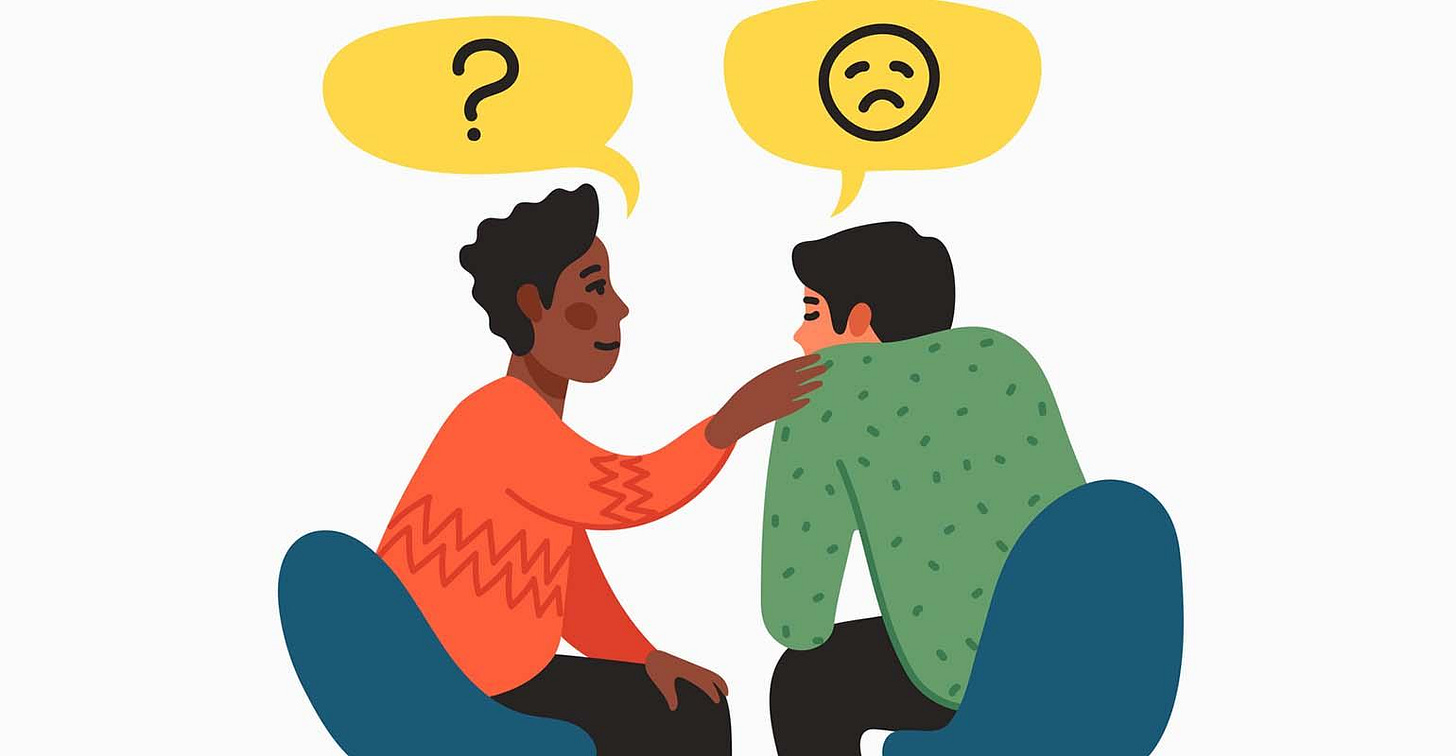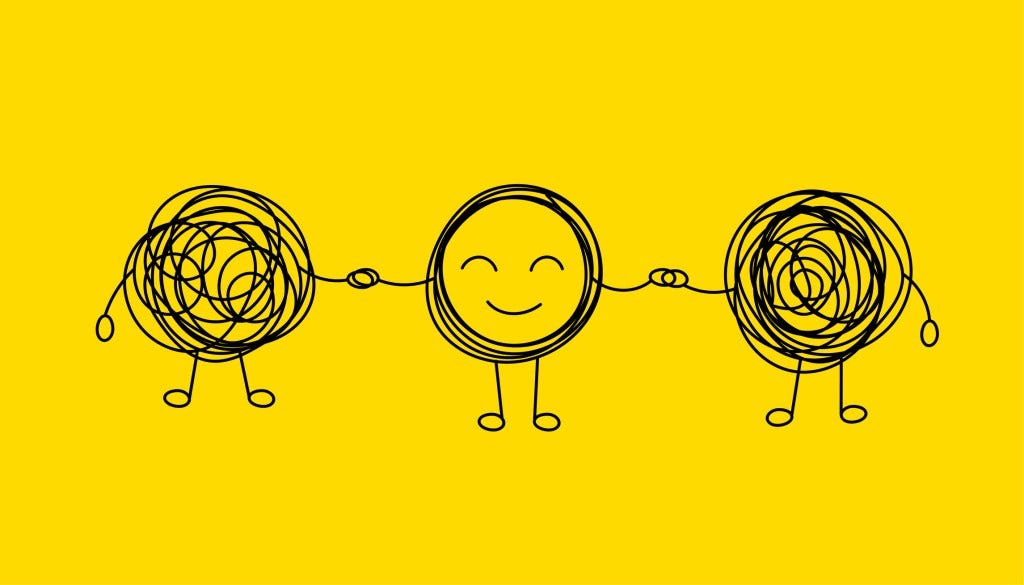The Power of Empathy
How Compassionate Leadership Builds Stronger Teams and Better Businesses
I'm Manuel Saez, I write to help founders master emotional intelligence to make decisions with clarity and confidence 🌻 EQ coach, 2X-founder & award-winning designer ➜ I love fixing old motorcycles 🛵 🏍
Reading time: 5 min.
Contents:
What is Empathy
Why Founders Need Empathy
Empathy, When Leading People
Empathy and Understanding Customers
Empathy in Negotiations
How I Practice Empathy
A Warning: When Empathy Can Hurt You
What is Empathy
Empathy is at the core of being human. Feeling someone else’s pain or joy connects us in ways words never could.
Empathy is often misunderstood as just feeling sympathy for someone else’s struggles, but it’s so much more. It’s the ability to truly understand and share another person’s feelings—to step into their shoes and experience their world.
It’s about going beyond your perspective and connecting with someone else’s emotions and experiences.
As a founder, this isn’t always easy. You’re juggling a million things—deadlines, strategies, and visions pulling you in all directions.
Yet empathy brings you back to what really matters—the people you work with and the customers you serve. It bridges the gap between hearts and minds, where true understanding begins.
In my experience, empathy has been a grounding force. When you get caught up in the daily grind of running a business, it’s easy to lose sight of the human element. That’s where empathy steps in.
Practicing empathy isn’t just about being nice—it’s about deeply understanding the needs and emotions of others. And for founders, that’s the difference between building a business that lasts and one that fizzles out.
Why Founders Need Empathy
As founders, we're constantly making decisions that affect our teams, partners, and customers.
It's easy to become transactional, focusing only on tasks, objectives, and KPIs. But business isn't just about hitting numbers; it's about human connections.
Empathy is the bridge that keeps those connections strong.
For me, empathy has been an essential skill in building cohesive teams. When your team members feel understood and supported, they're more engaged and willing to go the extra mile.
They become invested in the mission because they feel valued as people, not just workers. Empathy helps you see beyond the surface of job titles and roles and what drives individuals. It creates a sense of belonging and trust, which is the foundation of a successful team.
At the same time, empathy can define and drive your relationships with your customers.
Businesses that succeed in the long term are those that genuinely understand their customers' needs, pain points, and desires. That understanding doesn't come from data alone—it comes from empathizing with their journey.
Empathy can be your competitive advantage in a world where automation and efficiency are prized. By humanizing your business, you can create products and services that resonate with people on a deeper level.
Empathy, When Leading People
Leadership without empathy is just management.
Leadership with empathy is transformational.
I’ve seen it firsthand: a leader who focuses solely on performance might get quick results, but eventually, the team burns out or disengages.
On the other hand, a leader who leads with empathy builds a culture of trust, collaboration, and loyalty.
Leading with empathy isn’t about being soft; it’s about understanding the individual needs, fears, and motivations of your team.
That understanding fosters an environment where people feel safe and valued, allowing them to become the best version of themselves and produce their best work.
In my experience, simply asking my team how they’re doing—personally and professionally—has been a game changer. It’s not about solving their problems but about showing up for them when they need it most.
For example, during a particularly stressful time at my company, one of my team members was overwhelmed but didn’t feel comfortable speaking up.
By practicing empathy—checking in regularly and observing their behavior—I was able to offer support before things got worse.
When we practice empathy, we don’t just hear; we listen, we feel, and we understand. And that understanding is the best data for taking action.
Empathy and Understanding Customers
Empathy isn’t just an internal tool; it’s fundamental to understanding and serving your customers.
Empathy is the first step in design thinking because it allows you to imagine yourself in your users' shoes. This is how you create products that solve real problems.
When developing a new product or service, I always start by asking, "What is this customer's problem, and how do they feel about it?"
It’s not about what I think the problem is but about understanding it from the customer’s perspective.
Once I understand their emotional and practical pain points, I can design something that meets their needs and resonates with them more deeply and emotionally.
For example, when I was designing a vehicle for delivery workers, I became a delivery person. I experienced both the pain and the satisfaction that came with the job.
I worked side by side with other delivery workers and gained a deep understanding of the job’s dynamics—and, more importantly, the emotions people experienced while doing it.
That insight allowed us to tweak the product to meet their needs better, making the vehicles more comfortable and user-friendly. In the end, these changes significantly boosted customer satisfaction.
Empathy in design isn’t just a nice-to-have; it’s essential for building products people love and stick with.
Empathy in Negotiations
I used to think that winning a negotiation meant getting everything I wanted. I was wrong. The best outcome is when both sides walk away feeling like they’ve reached a fair and balanced agreement.
If you’ve ever been in a tough negotiation or a heated conflict, you know how easy it is to get stuck in your own perspective. But everything changes when you step into the other person’s shoes.
I remember a time when I was negotiating a deal with a potential partner. We had different priorities, and the conversation started to get tense. Instead of digging my heels in, I stepped back and tried to understand where they were coming from. What were their concerns? What was driving their decisions?
Once I understood their perspective, I was able to propose a solution that met both of our needs.
Empathy transforms negotiation from a zero-sum game into an opportunity for collaboration.
When you make an effort to understand the other person’s viewpoint, you unlock new pathways to resolve issues. This leads to stronger, longer-lasting partnerships.
How I Practice Empathy
For me, empathy isn't just a skill—it's a practice. It’s something I work on daily, much like exercise or meditation. I wasn’t always good at it.
Early in my career, I was too focused on the task at hand—whether developing a new product or closing a deal. I was fixated on the what, not the how—on getting the job done rather than considering the bigger picture and the perspectives of the people involved.
Over time, I realized those interactions could be far more meaningful and productive if I took the time to truly understand the other person’s perspective.
Here are a few ways I’ve learned to cultivate empathy in my everyday life:
Active Listening:
This is probably the most important practice. It means fully focusing on the person speaking without interrupting or immediately formulating a response. I’ve found that when I give my full attention to someone, I understand them better, and they feel heard. That, in itself, is powerful.Asking Clarifying Questions:
Sometimes, what someone says on the surface doesn’t fully convey their thoughts or emotions. I’ve learned to ask questions like, "Can you help me understand what you're feeling?" or "Could you elaborate on that?" Asking clarifying questions deepens my understanding and opens up space for them to share more fully.Challenging My Own Perspective:
It’s easy to assume that my experiences shape how everyone sees the world, but that’s rarely the case. Before reacting, I pause and try to step back, asking myself whether my assumptions truly align with the other person’s reality. This keeps me from jumping to conclusions and allows for a more genuine connection.Non-verbal Cues:
Communication isn’t just about words. People often communicate how they feel through body language, tone, and facial expressions. I make an effort to tune into those non-verbal cues as much as possible. It’s amazing how much you can pick up when you pay attention to what’s unspoken.
This practice has helped me in so many ways. It’s allowed me to deepen relationships, avoid unnecessary conflicts, and make more thoughtful decisions as a leader.
A Warning: When Empathy Can Hurt You
While empathy is a powerful tool, it can sometimes be misused by individuals who may take advantage of your understanding and compassion, especially in the fast-paced world of startups.
Some people might manipulate your empathy for their own benefit, using charm or vulnerability to gain your trust, only to exploit it later.
Human nature seeks connection and empathy fosters that, but not everyone values it in the same way. Some people use it to control or manipulate situations for their own gain, which is why setting boundaries is so important.
Empathy should build trust and collaboration, not enable manipulation. In my experience, pairing empathy with discernment is key.
Here are some strategies I use to maintain that balance:
Trust, but Verify:
Empathy encourages us to trust others, but that trust needs to be backed up by consistent actions.
My dad used to say, "To know someone, don’t listen to what they say—watch what they do." Someone’s words might sound right, but their actions over time will reveal their true intentions.
Paying attention to follow-through has shown me a lot about people's integrity. Verifying behaviors helps prevent empathy from being exploited by those with bad intentions.Set Boundaries:
Empathy doesn’t mean saying yes to everything or being always available. Knowing when to step back and protect your emotional energy is essential.
Saying no when necessary helps you avoid burnout and keeps your relationships healthier.
Clear boundaries also communicate to others that your kindness and understanding have limits, which helps prevent manipulation.Check-in with Your Team:
Toxic behavior can sometimes go unnoticed, especially when team members don’t feel comfortable speaking up.
Regular check-ins create a culture of open communication, allowing you to spot early signs of unhealthy dynamics.
Staying connected and encouraging honesty can help you address issues before they escalate, protecting the emotional well-being of the whole team.Balance Empathy with Objectivity:
Empathy helps you understand someone’s emotions, but decisions in a startup need to be based on facts.
While it’s important to acknowledge feelings, you also need to evaluate situations objectively.
If someone’s behavior is consistently harmful, it may be time to make tough decisions—like setting stricter boundaries or even parting ways with a toxic team member or partner.
Empathy is one of the most powerful tools a founder can cultivate.
It offers far-reaching benefits for both leadership and business success. Here’s why founders should make empathy a core practice:
Builds stronger teams: Empathy fosters trust and understanding within your team, leading to higher engagement, better communication, and a stronger sense of belonging.
Enhances customer relationships: By truly understanding your customers’ needs and pain points, empathy helps you create products and services that resonate deeply and solve real problems.
Improves decision-making: Empathy allows you to consider different perspectives, leading to more thoughtful, balanced decisions, especially in challenging situations.
Empathy is a skill that emotionally intelligent people practice. It can be learned and strengthened over time. For founders, it can have a profound impact on how they lead and grow their businesses.
Developing emotional intelligence takes time and practice, but with the right guidance, you can gain deeper insights into your team, your customers, and yourself.
If you're ready to take the next step in leading with empathy, my coaching can help guide you on that journey.
Thank you for reading. Please bookmark this article and share it with anyone who may benefit from it.
Sending you good vibes 🌻
Manuel Saez






